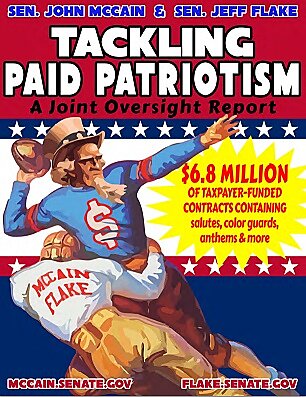Arizona Senators John McCain and Jeff Flake made a splash yesterday with their report on “paid patriotism.” The report shows that the National Guard and military services, in the name of marketing themselves to potential recruits, paid millions over the last several years to professional sports teams and a couple universities for on-field tributes to military personnel, which appeared to fans as unpaid expressions of affection. According the report:
These paid tributes included on-field color guard, enlistment and reenlistment ceremonies, performances of the national anthem, full-field flag details, ceremonial first pitches͕ and puck drops. The National Guard paid teams for the “opportunity” to sponsor military appreciation nights and to recognize its birthday. It paid the Buffalo Bills to sponsor its Salute to the Service game. DOD even paid teams for the “opportunity” to perform surprise welcome home promotions for troops returning from deployments and to recognize wounded warriors.
In other cases, it seems that a military marketing or promotional contract paid for a lot of personnel to attend games without doing much of marketing value. They just wanted tickets.
Letters from Pentagon officials, appended to the report, ban these practices. A letter from Commissioner Roger Goodell of the National Football League, says that its teams will better differentiate what is and isn’t advertising and refund “inappropriate payments,” though what that includes is unclear. The NFL also included for the report a lengthy list of the unpaid troop tributes and pro-military acts of the NFL and its teams. Major League Baseball and the National Basketball Association also say they’ll avoid paid tributes.
Besides the leagues, the major culprits here, in both ticket abuse and fake tributes, are the U.S. Air Force and Army National Guard from various states. The report never mentions the regular Army or the Marine Corps. The Navy comes up only once, due to the $24,000 that the Naval Supply Systems Command’s spent on Phillies tickets in both 2012 and 2014. It’s not clear why that purchase is in the report, given that the online contract says the goal is “social and recreational” purposes, not recruiting or promotions. Maybe that’s too much recreation on the taxpayer dime, but there is no misdirection, which seems to be report’s concern.
Some might wonder why paid tributes are so bad. As the Pentagon’s responses to Flake’s inquiries all note, advertising is a legitimate way for the military to recruit volunteers. Plus, it’s not as if fans received some sacred promise from the profit-making entertainment corporations—the teams— that they support not to blur the line between performance and advertising.
Still, there are a couple good reasons to be annoyed by paid tributes. First, it’s unclear that advertising during sports events, even the traditional, non-scandalous sort, is an efficient way to reach recruits. A Pentagon document appended to the report notes, reasonably, that professional sports broadcasts, especially football, reach much of the target audience for recruiting. But, as the report notes, the Pentagon didn’t offer evidence that buying sports advertising or sponsorships to reach this audience is more cost-effective than alternative marketing strategies in generating recruits.
One likely reason for the military’s limited interest in the ostensible goal of this advertising is that it serves additional ends. Like the Air Force’s Thunderbirds and Navy’s Blue Angels air show units, the goal of military advertising arguably is public support or even awe. That’s conducive not only recruits but also to budgetary support and organizational health, sometimes at the expense of other public organizations. Because those aren’t necessarily kosher uses of tax dollars, it’s safer to say it’s all for recruiting.
If that misdirection is a problem, it’s a far more costly one than the one the report highlights. The press is mostly using the $6.8 million figure on the report’s cover as an estimate of spending on paid troop tributes from 2012 until 2015. Actually, it is unclear what the report means by that figure. But whatever the right amount, it’s a fraction of the $53 million that the Pentagon reports spending on marketing and advertising deals with sports teams over those three years. And that’s a drop in the bucket of the total marketing budget. Maybe the Senators should broaden their scope.
The bigger reason to be offended by paid tributes is their particular brand of phoniness. Sneaky product placement is annoying. Getting paid to display your regard for military service is a more unseemly trick, a point Senator Flake made in interviews yesterday.
But weren’t these displays a bit unseemly already? Uncompensated ballpark tributes do not lack for pretension. It is easy for public announcers to make fans stand and cheer by saying “heroes” during the seventh inning stretch or before kickoff, but hard to make them do so for the public reasons. The social patriotism produced for quick display in stadiums might not be much more legitimate than the paid kind. Maybe ballparks are a bad place to commemorate wars.

